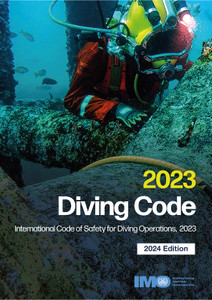
Procedures for Port State Control (KF650E) - 2023 (2024 Edition)
Port State control inspections contribute to ensuring that global maritime standards are being implemented consistently on all ships. This publication provides guidance for port State control officers on the conduct of inspections to support harmonization in the way inspections are carried out worldwide.
This edition includes amendments to Guidelines for the detention of ships (appendix 2) and Guidelines for port State control under MARPOL Annex VI (appendix 18), and new Guidelines for inspection of anti-fouling systems on ships (appendix 19).
The International Maritime Organization (IMO) has always acknowledged that effective implementation and enforcement of the global maritime standards contained in its conventions are primarily the responsibility of the flag State to which a ship?s flag is flying. Nevertheless, the Organization has also recognized that the exercise of the right to carry out port State control, as provided for in relevant international conventions, contributes to ensuring that global maritime standards are being implemented consistently on all ships. Port State control involves the inspection of foreign ships in national port areas to verify that the condition and operation of a ship and its equipment comply with the relevant requirements contained in the applicable mandatory international instruments to which the port State is a Party.
The Organization cooperates with port State control regimes within the framework of resolution A.682(17) on Regional cooperation in the control of ships and discharges to support the harmonization of port State control activities. In this context, the IMO Sub-Committee on Implementation of IMO Instruments (III) ? recognizing the need for a single comprehensive, consolidated and updated instrument to facilitate the work of maritime administrations in general, and port State control officers (PSCOs) in particular ? reviewed and amalgamated existing resolutions and documents on port State control. This resulted in the adoption of resolution A.1185(33) by the IMO Assembly, on 6 December 2023, which contains, as an annex, the Procedures for port State control, 2023 following successive revocation of resolutions A.1155(32), A.1138(31), A.1119(30), A.1052(27), A.882(21), A.787(19), A.742(18), A.597(15) and A.466(XII). The Assembly requested the Maritime Safety Committee and the Marine Environment Protection Committee to keep the Procedures under review and to amend them as necessary.
The 2024 edition of Procedures for Port State Control, 2023 provides guidance to PSCOs on the conduct of inspections of foreign ships to promote consistency in the way inspections are carried out worldwide and to harmonize the criteria for deciding on deficiencies found on board relating to the ship, its equipment or its crew, as well as the application of procedures. It contains 20 appendices, including the Code of good practice for port State control officers, and a series of technical and operational guidelines with respect to relevant IMO conventions and mandatory codes, such as SOLAS 1974, SOLAS PROT 1988, LL 1966, LL PROT 1988, MARPOL, STCW 1978, TONNAGE 1969, COLREG 1972, AFS 2001 and the International Safety Management Code. This edition contains amendments to the Guidelines for the detention of ships (appendix 2), the Guidelines for port State control under MARPOL Annex VI (appendix 18), and new Guidelines for inspection of anti-fouling systems on ships (appendix 19).
Instruments relevant to Procedures for Port State Control, 2023 (2024 edition) is an electronic publication produced by IMO. It comprises the full texts of all the instruments featured in the List of instruments relevant to Procedures for port State control, 2023 given in appendix 20 of this publication, including the Guidelines for the use of electronic record books under MARPOL, which provide further guidance for PSCOs in relation to inspection of relevant record books or logs on board a ship.
Foreword
Procedures for port State control, 2023 (resolution A.1185(33))
Chapter 1- General
Chapter 2 - Port State inspections
Chapter 3 - Contravention and detention
Chapter 4 - Reporting requirements
Chapter 5 - Review procedures
Appendices
IMO
As a specialised agency of the United Nations, the International Maritime Organization (IMO) is the global standard-setting authority for the safety, security and environmental performance of international shipping. Its main role is to create a regulatory framework for the shipping industry that is fair and effective, universally adopted and universally implemented.
In other words, its role is to create a level playing field so that ship operators cannot address their financial issues by simply cutting corners and compromising on safety, security and environmental performance. This approach also encourages innovation and efficiency.
Shipping is a truly international industry, and it can only operate effectively if the regulations and standards are themselves agreed, adopted and implemented on an international basis. And IMO is the forum at which this process takes place.
- Number of Pages:
- 164
- Book Height:
- 150 mm
- Book Width:
- 200 mm
- Publication Date:
- May 2024
- Author:
IMO
- Published Date:
- May 2024





